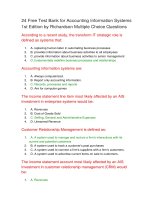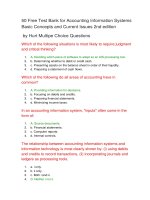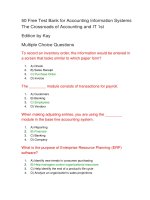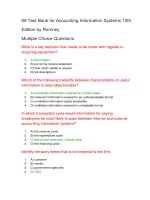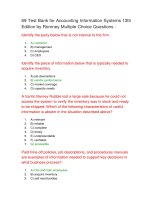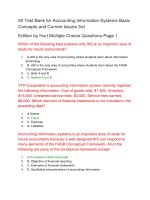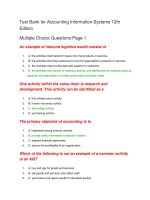89 free test bank for cost accounting 14th edition
Bạn đang xem bản rút gọn của tài liệu. Xem và tải ngay bản đầy đủ của tài liệu tại đây (100.62 KB, 19 trang )
89 Free Test Bank for Cost Accounting 14th Edition
by Horngren
Multiple Choice Questions
________ is the acquisition, coordination, and assembly of
resources to produce a product or deliver a service.
1.
A. Research and development
2.
B. Customer service
3.
C. Production
4.
D. Marketing
Which of the following statements about customer value is NOT
true?
1.
A. Customer value is shown in a corporation's balance sheet.
2.
B. Creating value for customers is an important part of planning and
implementing strategy.
3.
C. How our product delivers customer value should be determined as part
of a company's strategy formulation.
4.
D. It is possible to simultaneously lower cost and increase customer value.
Strategy is formulated by answering all of the following EXCEPT:
1.
A. Who are our most important customers?
2.
B. Is industry demand growing or shrinking?
3.
C. Will our external auditors certify our strategy?
4.
D. How sensitive are purchasers to price, quality, and service?
Financial accounting:
1.
A. focuses on the future and includes activities such as preparing next
year's operating budget
2.
3.
4.
B. must comply with GAAP (generally accepted accounting principles.
C. reports include detailed information on the various operating segments
of the business such as product lines or departments
D. is prepared for the use of department heads and other employees
A data warehouse or infobarn:
1.
A. is reserved for exclusive use by the CFO
2.
B. is primarily used for financial reporting purposes
3.
C. stores information used by different managers for multiple purposes
4.
D. gathers only nonfinancial information
R&D, production, and customer service are business functions
that are all included as part of:
1.
A. the value chain
2.
B. benchmarking
3.
C. marketing
4.
D. the supply chain
________ aims to improve operations throughout the value chain
and to deliver products and services that exceed customer
expectations.
1.
A. Total Quality Management
2.
B. Innovation
3.
C. Customer response time
4.
D. Cost and efficiency
Management accounting includes all of the following EXCEPT
1.
A. implementing strategies
2.
B. developing budgets
3.
C. preparing special studies and forecasts
4.
D. preparing the statement of cash flows
The approaches and activities of managers in short-run and longrun planning and control decisions that increase value for
customers and lower costs of products and services are known
as:
1.
A. value chain management
2.
B. enterprise resource planning
3.
C. cost management
4.
D. customer value management
Customers are demanding improved performance related to:
1.
A. reduced costs
2.
B. both reduced costs and increased quality
3.
C. lower costs, improved quality, and improved customer service
4.
D. All of these answers are correct.
Management accounting information includes:
1.
A. tabulated results of customer satisfaction surveys
2.
B. the cost of producing a product
3.
C. the percentage of units produced that are defective
4.
D. All of these answers are correct.
Which of the following is NOT one of the questions management
accountants might attempt to help answer in the formulation of
strategy?
1.
A. Who are our most important customers?
2.
B. What substitute products exist in the marketplace?
3.
4.
C. Does the strategy comply with GAAP (Generally Accepted Accounting
Principles.?
D. Will adequate cash be available to implement the strategy?
Which of the following statements refers to management
accounting information?
1.
A. There are no regulations governing the reports.
2.
B. The reports are generally delayed and historical.
3.
C. The audience tends to be stockholders, creditors, and tax authorities.
4.
D. It primarily measures and records business transactions.
Cost accounting provides all of the following EXCEPT:
1.
A. information for management accounting and financial accounting
2.
B. pricing information from marketing studies
3.
C. financial information regarding the cost of acquiring resources
4.
D. nonfinancial information regarding the cost of operational efficiencies
Cost accounting:
1.
A. provides information on the efficiency of factory labor
2.
B. provides information on the cost of servicing commercial customers
3.
C. provides information on the performance of an operating division
4.
D. All of these answers are correct.
Modern cost accounting plays a role in:
1.
A. planning new products
2.
B. evaluating operational processes
3.
C. controlling costs
4.
D. All of these answers are correct.
________ describes the flow of goods, services, and information
from the initial sources of materials and services to the delivery of
products to consumers, regardless of whether those activities
occur in the same organization or in other organizations.
1.
A. The value chain
2.
B. The supply chain
3.
C. Product differentiation
4.
D. Distribution
________ is a philosophy in which management improves
operations throughout the value chain to deliver products and
services that exceed customer expectations.
1.
A. Cost-benefit approach
2.
B. Customer focus
3.
C. Customer relationship management
4.
D. Total quality management
Processing orders and shipping products or services to
customers (also called outbound logistics. is also known as
1.
A. customer focus
2.
B. distribution
3.
C. marketing
4.
D. supply chain
In designing strategy, a company must match the opportunities
and threats in the marketplace with:
1.
A. those of the CFO (Chief Financial Officer.
2.
B. its resources and capabilities
3.
C. branding opportunities
4.
D. capabilities of current suppliers
Which of the following statements concerning an organization's
strategy is NOT true?
1.
A. Strategy specifies how an organization matches its own capabilities with
the opportunities in the marketplace to accomplish its objectives.
2.
B. Management accountants provide input to help managers formulate
strategy.
3.
4.
C. A good strategy will always overcome poor implementation.
D. Businesses usually follow one of two broad strategies: offering a quality
product at a low price, or offering a unique product or service priced higher
than the competition.
Whose perceptions of the company's products or services are the
most important to the manager?
1.
A. board of directors' perception
2.
B. customers' perception
3.
C. president's perception
4.
D. stockholders' perception
________ is the generation of, and experimentation with, ideas
related to new products, services, or processes.
1.
A. Research and development
2.
B. Design of products, services, or processes
3.
C. Production
4.
D. Marketing
Management accounting:
1.
2.
A. focuses on estimating future revenues, costs, and other measures to
forecast activities and their results
B. provides information about the company as a whole
3.
C. reports information that has occurred in the past that is verifiable and
reliable
4.
D. provides information that is generally available only on a quarterly or
annual basis
Which of the following people is LEAST likely to use management
accounting information?
1.
A. the controller
2.
B. a shareholder evaluating a stock investment
3.
C. the treasurer
4.
D. an assembly department supervisor
________ is the detailed planning and engineering of products,
services, or processes.
1.
A. Distribution
2.
B. Design of products, services, or processes
3.
C. Production
4.
D. Marketing
The person most likely to use ONLY financial accounting
information is a:
1.
A. factory shift supervisor
2.
B. vice president of operations
3.
C. current shareholder
4.
D. department manager
Which of the following descriptors refers to management
accounting information?
1.
A. It is verifiable and reliable.
2.
B. It is driven by rules.
3.
C. It is prepared for shareholders.
4.
D. It provides reasonable and timely estimates.
________ describe(s. the flow of goods, services, and information
from the purchase of materials to the delivery of products to
consumers, regardless of whether those activities occur in the
same organization or with other organizations.
1.
A. Supply chain
2.
B. Key success factors
3.
C. Continuous improvement
4.
D. Customer focus
Which of the following groups would be LEAST likely to receive
detailed management accounting reports?
1.
A. stockholders
2.
B. sales representatives
3.
C. production supervisors
4.
D. managers
________ is the manner by which companies promote and sell
their products or services to customers or perspective customers.
1.
A. Distribution
2.
B. Customer service
3.
C. Research and development
4.
D. Marketing
________ is the after-sale support provided to customers.
1.
A. Distribution
2.
B. Customer service
3.
C. Production
4.
D. Marketing
Strategy specifies:
1.
A. how an organization matches its own capabilities with the opportunities
in the marketplace
2.
B. standard procedures to ensure quality products
3.
C. incremental changes for improved performance
4.
D. the demand created for products and services
Customer response time involves:
1.
A. the speed it takes a customer to respond to an advertisement and place
an order
2.
B. the speed at which an organization responds to customer requests
3.
C. the speed it takes to develop a new product
4.
D. the speed it takes an organization to develop a Total Quality
Management (TQM. program
An Enterprise Resource Planning System can best be described
as:
1.
A. a collection of programs that use a variety of unconnected databases
2.
B. a single database that collects data and feeds it into applications that
support each of the company's business activities, such as purchases,
production, distribution, and sales
3.
C. a database that is primarily used by a purchasing department to
determine the correct amount of a particular supply item to purchase
4.
D. a sophisticated means of linking two or more companies to facilitate their
planning processes
Which of the following statements about a company's supply
chain is true?
1.
A. A company's supply chain is always internal to a firm.
2.
B. A company's supply chain is always external to a firm.
3.
C. A company's supply chain is the same thing as a company's value chain.
4.
D. Management accountants provide information to enhance a company's
supply chain.
________ is a strategy that integrates people and technology in
all business functions to enhance relationships with customers,
partners, and distributors.
1.
A. Supply-chain analysis
2.
B. Customer relationship management
3.
C. Value-chain analysis
4.
D. Continuous quality improvement
Customer relationship management initiatives use technology to
coordinate all:
1.
A. production activities
2.
B. research activities
3.
C. customer-facing activities
4.
D. inventory management activities
Financial accounting provides the primary source of information
for:
1.
A. decision making in the finishing department
2.
B. improving customer service
3.
C. preparing the income statement for shareholders
4.
D. planning next year's operating budget
Which item is NOT an area that customers want to see improved
levels of performance in?
1.
A. innovation
2.
B. quality
3.
C. cost and efficiency
4.
D. profit
Place the four business functions in the order they appear along
the value chain: Customer service; Design; Marketing;
Production
1.
A. Customer Service, Design, Production, Marketing
2.
B. Customer Service, Marketing, Production, Design
3.
C. Design, Production, Marketing, Customer Service
4.
D. Design, Customer Service, Production, Marketing
Which of the following types of information are used in
management accounting?
1.
A. financial information
2.
B. nonfinancial information
3.
C. information focused on the long term
4.
D. All of these answers are correct.
Financial accounting is concerned primarily with:
1.
A. external reporting to investors, creditors, and government authorities
2.
B. cost planning and cost controls
3.
C. profitability analysis
4.
D. providing information for strategic and tactical decisions
Financial accounting provides a historical perspective, whereas
management accounting emphasizes:
1.
A. the future
2.
B. past transactions
3.
C. a current perspective
4.
D. reports to shareholders
________ is the delivery of products or services to customers.
1.
A. Distribution
2.
B. Customer service
3.
C. Production
4.
D. Design of products, services, or processes
Managers use management accounting information to ________
strategy.
1.
A. choose
2.
B. communicate
3.
C. implement
4.
D. All of these answers are correct.
The value chain is the sequence of business functions in which:
1.
A. value is deducted from the products or services of an organization
2.
B. value is proportionately added to the products or services of an
organization
3.
C. products and services are evaluated with respect to their value to the
supply chain
4.
D. usefulness is added to the products or services of an organization
Which of the following is NOT a way for a company to improve
customer response time?
1.
A. Increase capacity of bottleneck operations.
2.
B. Purchase material in larger quantities.
3.
C. Use faster delivery procedures.
4.
D. Produce the product more quickly.
89 Free Test Bank for Cost Accounting 14th Edition by
Horngren Multiple Choice Questions-Page 2
Responsibilities of a CFO include all of the following EXCEPT:
1.
A. providing financial reports to shareholders
2.
B. managing short-term and long-term financing
3.
C. investing in new equipment
4.
D. preparing federal, state, and international tax returns
The process of preparing a budget:
1.
A. forces coordination and communication across business functions
2.
B. increases accounting efficiencies
3.
C. reduces overcapacity
4.
D. promotes production automation
Employees ________ how their performance is measured.
1.
A. pay close attention to
2.
B. pay no attention to
3.
C. rarely know
4.
D. None of the above are correct.
Staff management includes:
1.
A. manufacturing managers
2.
B. human-resource managers
3.
C. purchasing managers
4.
D. distribution managers
Which of the following issues is NOT addressed by the SarbanesOxley legislation?
1.
A. improving internal control
2.
B. corporate governance
3.
C. disclosure practices of public corporations
4.
D. disclosure practices of private companies
A well-conceived plan allows managers the ability to:
1.
A. not make decisions again until the next planning session
2.
B. keep lower-level managers from implementing change
3.
4.
C. underestimate costs so that actual operating results will be favorable
when comparisons are made
D. take advantage of unforeseen opportunities
Which item is NOT an indication of competence under the
Standards of Ethical Conduct?
1.
A. Maintain an appropriate level of professional expertise by continually
developing knowledge and skills.
2.
B. Keep information confidential except when disclosure is authorized or
legally required.
3.
C. Perform professional duties in accordance with relevant laws,
regulations, and technical standards.
4.
D. Provide decision support information and recommendations that are
accurate, clear, concise, and timely.
Which item is NOT a guideline used by management accountants
to assist in strategic and operational decision making?
1.
A. cost-benefit approach
2.
B. behavioral and technical considerations
3.
C. different costs for different purposes
4.
D. balanced scorecard
The person(s. directly responsible for attaining of organizational
objectives is/are:
1.
A. the treasurer
2.
B. line management
3.
C. the controller
4.
D. the chief financial officer
Which of the following statements concerning performance
reports is NOT correct?
1.
A. The performance report shows actual performance as compared to the
budget.
2.
B. The performance report is a feedback tool.
3.
C. The performance report often leads to more investigations and action.
4.
D. The performance report contains no actual results due to confidentiality.
Place the five steps in the decision-making process in the correct
order: A = Obtain information; B = Make decisions by choosing
among alternatives; C = Identify the problem and uncertainties; D
= Implement the decision; E = Make predictions about the future
1.
A. C D B E A
2.
B. E D A B C
3.
C. C A E B D
4.
D. A E B D C
Planning consists of all of these areas EXCEPT:
1.
A. selecting organizational goals
2.
B. deciding how to attain the desired goals
3.
C. evaluating performance
4.
D. predicting results under various alternatives
A budget:
1.
A. is a quantitative expression of a proposed management plan
2.
B. helps translate strategy into actions
3.
4.
C. aids in the coordination and communication among various business
functions
D. All of these answers are correct.
The scenario that resources should be spent if the expected
benefits to the company exceed the expected costs describes:
1.
A. cost-benefit approach
2.
B. behavioral and technical considerations
3.
C. balanced scorecard
4.
D. different costs for different purposes
Ethical challenges for management accountants include:
1.
A. whether to accept gifts from suppliers, knowing it is an effort to indirectly
influence decisions
2.
B. whether to report unfavorable department information that may result in
unfavorable consequences for a friend
3.
C. whether to file a tax return this year
4.
D. Both A and B are correct.
A report showing the actual financial results for a period
compared to the budgeted financial results for that same period
would most likely be called a:
1.
A. strategic plan
2.
B. management forecast
3.
C. performance report
4.
D. revised plan
________ includes providing financial information for reports to
managers and shareholders, and overseeing the overall
operations of the accounting system.
1.
A. Internal audit
2.
B. External audit
3.
C. Controller ship
4.
D. Treasury
Which statement is true?
1.
A. Management is primarily a technical activity.
2.
B. People do not react to measurements.
3.
C. Employees spend more attention on those variables that are getting
measured.
4.
D. Resources should be spent if the expected benefits to the company are
less than the expected costs.
________ includes banking and short- and long-term financing,
investments, and cash management.
1.
A. Risk management
2.
B. Internal audit
3.
C. Controllership
4.
D. Treasury
Examples of the controller's functions include all EXCEPT:
1.
A. operations administration
2.
B. budgeting
3.
C. investor relations
4.
D. general ledger
If there is an ethical conflict concerning your direct supervisor,
you may contact all of the following groups EXCEPT:
1.
A. local media
2.
B. audit committee
3.
C. executive committee
4.
D. board of directors
The most important planning tool is a ________.
1.
A. performance evaluation report
2.
B. balanced scorecard
3.
C. goal
4.
D. budget
Which item is an indication of integrity under the Standards of
Ethical Conduct?
1.
2.
A. Refrain from engaging in any conduct that would prejudice carrying out
duties ethically.
B. Communicate information fairly and objectively.
3.
C. Keep information confidential except when disclosure is authorized or
legally required.
4.
D. Recognize and communicate professional limitations or other constraints
that would preclude responsible judgment or successful performance of an
activity.
Which item is an indication of credibility under the Standards of
Ethical Conduct?
1.
A. Maintain an appropriate level of professional expertise by continually
developing knowledge and skills.
2.
B. Refrain from using confidential information for unethical or illegal
advantage.
3.
C. Abstain from engaging in or supporting any activity that might discredit
the profession.
4.
D. Disclose delays or deficiencies in information, timeliness, processing, or
internal controls in conformance with organization policy and/or applicable
law.
Management accounting is considered most likely to be
successful when it:
1.
A. helps creditors evaluate the company's performance
2.
B. helps investors improve their decisions
3.
C. is timely
4.
D. is relevant and reported annually
The primary criterion when faced with a resource allocation
decision is:
1.
A. cost minimization
2.
B. reduction in the amount of time required to perform a particular job
3.
C. achievement of organizational goals
4.
D. how well the alternative options help achieve organizational goals in
relation to the costs incurred for these systems
Which item is NOT an indication of confidentiality under the
Standards of Ethical Conduct?
1.
A. Keep information confidential except when disclosure is authorized or
legally required.
2.
B. Inform all relevant parties regarding appropriate use of confidential
information.
3.
C. Refrain from using confidential information for unethical or illegal
advantage.
4.
D. All of the above indicate confidentiality.
The act of simply measuring and reporting information:
1.
A. focuses the attention of employees on those processes
2.
B. diverts employee's attention to other activities
3.
C. disproves the saying "What gets measured gets managed."
4.
D. has no effect on employee behavior
Which of the following actions should a management accountant
take first in confronting a potential ethical conflict concerning your
direct supervisor?
1.
A. Inform the Board of Directors of the existence of a potential conflict.
2.
B. Confront the supervisor directly.
3.
C. Discuss the situation with your supervisor's direct supervisor.
4.
D. Review your organization's procedures concerning resolution of such a
conflict.
Long term financing is an integral part of the ________ function in
an organization.
1.
A. treasurer's
2.
B. controller's
3.
C. internal audit
4.
D. president's
Linking rewards to performance:
1.
A. helps to motivate managers
2.
B. allows companies to charge premium prices
3.
C. should only be based on financial information
4.
D. All of these answers are correct.
All of the following report to the CFO EXCEPT the:
1.
A. controller
2.
B. tax department manager
3.
C. production manager
4.
D. treasurer
The Standards of Ethical Conduct for management accountants
include concepts related to:
1.
A. competence, performance, integrity, and reporting
2.
B. competence, confidentiality, integrity, and credibility
3.
C. experience, integrity, reporting, and objectivity
4.
D. None of these answers are correct.
Planning includes all of the following EXCEPT
1.
A. identifying the problem and uncertainties.
2.
B. obtaining information.
3.
C. providing feedback to help with future decision making.
4.
D. making predictions about the future.
If there is an ethical conflict concerning your direct supervisor,
when is it appropriate to contact authorities or individuals NOT
employed by the organization?
1.
A. when there is a personal conflict
2.
B. when your supervisor is about to receive a bonus
3.
C. when there is a clear violation of the law
4.
D. when you are about to be terminated
Control measures should:
1.
A. be set and not changed until the next budget cycle
2.
B. be flexible to allow for employees who are slackers
3.
4.
C. be kept confidential from employees so that competitors don't have an
opportunity to gain a competitive advantage
D. be linked by feedback to planning
Line management includes:
1.
A. manufacturing managers
2.
B. human-resource managers
3.
C. information-technology managers
4.
D. management-accounting managers
A budget can serve as:
1.
A. a planning tool
2.
B. a control tool
3.
C. a basis for preparing financial statements
4.
D. a planning and control tool
The person(s. responsible for providing advice and assistance to
line managers is/are:
1.
A. the controller
2.
B. the chief financial officer
3.
C. staff management
4.
D. the treasurer
The ________ is primarily responsible for management
accounting and financial accounting.
1.
A. COO (Chief Operating Officer.
2.
B. CIO (Chief Information Officer.
3.
C. treasurer
4.
D. controller
Which of the following statements about the cost-benefit
approach is true?
1.
2.
A. Resources should be spent if they are expected to better attain company
goals in relation to the expected costs of these resources.
B. In a cost-benefit analysis, both costs and benefits are easy to obtain.
3.
C. Resources should be spent if the costs of a decision outweigh the
benefits of the decision.
4.
D. A cost-benefit approach would not be appropriate for a decision to install
a budget system or not
